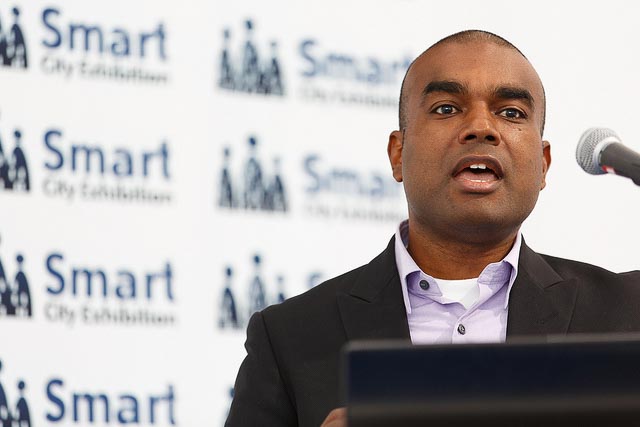When Nigel Jacob became a fellow working in Boston City Hall a decade ago, there wasn't exactly a clear job description.
But he quickly started trying to work with other city departments to find solutions to problems facing residents -- small tweaks that, in some cases, could dramatically improve the way a department served the public.
The idea was that citizens don't always have the most positive interactions with local government, but perhaps slight changes could go a long way towards improving them.
"I just didn't know any better," joked Jacob, who earlier this month spoke at the Kinder Institute Forum and met with Houston city leaders.
Initially, he wasn't sure whether others would embrace the philosophy. Fortunately, they did, and he soon found himself co-leading a new project with a funny name: The Mayor's Office of New Urban Mechanics.
That title was based on the nickname of then-Mayor Tom Menino, known as the "urban mechanic" for tinkering with the city to improve quality-of-life. But it's continued into the subsequent administration of Mayor Marty Walsh. The role gave Jacob the ability to work across departments and the ability to pursue projects that were considered outside the box.
Since then, Jacob has garnered national acclaim, won plenty of awards, and developed a reputation as one of the country's most innovative thinkers who is reshaping the way local governments connect with constituents.
His department has developed a long list of projects that improved city operations, often with solutions that seem so simple that it's a wonder nobody had created them before. It's exactly that approach -- doing things people think government should be doing -- that has made his work so popular. Essentially, he wants to raise residents' expectations about city government.
"I wanted to make people's lives better on a bigger scale," Jacob said, explaining his approach. In particular, he said, his office focuses on creating products and solutions that citizens both want and need. It's a simple goal. But it's not one that the public sector has the best track record embracing. "We don't always do that so well in government," Jacob said.
One of his biggest hits -- the one that helped elevate Jacob's name nationally -- is Street Bump. The app uses the sensors and GPS inside drivers' smart phones to automatically detect, map, and report potholes they encounter while driving. Even more impressive: the app helped identify another problem on the roads. City officials discovered the biggest cause of bumpy roads isn't potholes; rather, it's sunken manhole covers. The findings prompted the city to work with utility companies to fix more than 1,200 manhole covers.
Then there's Citizens Connect, the city's 311 app that allows users to submit and track requests in a streamlined process. The app was integrated directly with the city's work order management system "so that, when a resident snapped a photo of an issue such as pothole, the next person that saw it was the right person to fix it," according to the city. The app made repairs faster and more efficient, and it has a cute touch at the end: After the city fixes the problem (a pothole, a busted sidewalk, etc.) the citizen who reported it often receives a photo of the fix and the work crew that completed it.
Not everything coming out of Jacob's office is high-tech. Inspired by the growing popularity of food trucks, it developed City Hall to Go, a retrofitted bomb squad truck designed to function as a mobile City Hall. City staffers would go into neighborhoods and assist residents with face-to-face services such as paying a parking ticket or getting a library card. More than 4,000 transactions took place on the roving vehicle. "Innovation is not always about technology," Jacob said.
One of creations he's most proud of is Discover, a web portal he describes as "Hotels.com for schools." In Boston, the city-run school system allows parents to choose which school their kid attends, due in part to a history of unequal schools across racial lines. But until recently, the basis of that system was an unwieldy, eight-page pamphlet sent to parents that outlined the complicated selection process and school options. It was so overwhelming that many parents -- especially those with low-incomes who work multiple jobs -- would become frustrated, then procrastinate and register for school too late. The system, designed to reverse inequity, was failing the very people it was intended to lift up.
With Discover, parents have access to an uncluttered web interface that explains the program and allows them to sort through schools using a variety of different filters. The intent is to simplify the process and avoid overwhelming parents with too much information, leading to more timely registration.
Jacob said the new service -- like most aspects of government -- is far from perfect. But that's not exactly the intent. The goal is to make slight improvements that gradually improve interactions with the public.
"The process of using a government service makes people furious," Jacob said. "We need to take people from furious down to angry."
Before his team pursues a project, Jacob said, it has to meet three basic criteria. Will it improve residents' lives? Is there a way to test the project's effectiveness? And can it be scaled up if it's a hit?
His approach is only possible when a government's top leadership buys into the philosophy, as has been the case in Boston. And part of that philosophy requires a willingness to embrace experimentation. It's a shift in expectations that may put some government leaders out of their comfort zone, but so far, it's working in Boston.
"Innovation," Jacob said, "requires an understanding that it might not always work."


